Acquisition Quiz 1
1/47
There's no tags or description
Looks like no tags are added yet.
Name | Mastery | Learn | Test | Matching | Spaced |
|---|
No study sessions yet.
48 Terms
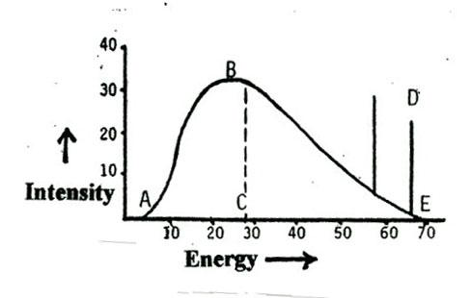
In the x-ray beam spectrum, point E would be indicative of:
A. Max wavelength
B. Peak kVp
C. Total mAs
D. Average voltages
E. Filtration
B.Peak kV
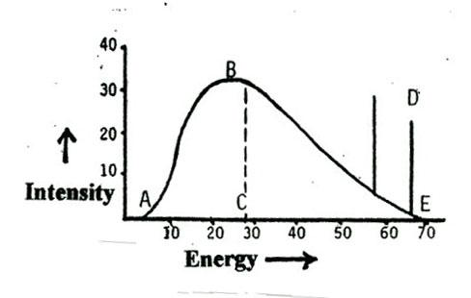
In the x-ray beam spectrum graph, the average voltage of the Bremsstrahlung produced is:
A. 67kV
B. 70kV
C. 32kV
D. 5kV
E. 28kV
E. 28kV
In the diagnostic range, the majority of primary x-ray produced are:
A. Characteristic
B. Brems
C. Compton
D. Photoelectric
B. Brems
A high E x-ray photon has a long wavelength: True or false?
False: short
Consider the situation:
Change from high atomic # material to low atomic #
What will the new curve look like?
Curve shifts down
Characteristic curve shifts left
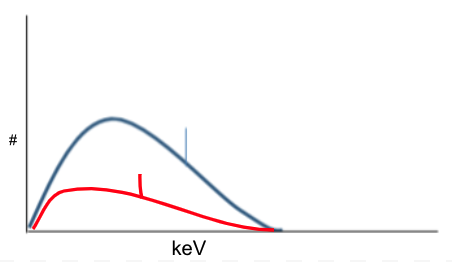
Consider the situation:
Change from 82 kVp to 72 kVp
The continuous curve shifts:
A. remains the same
B. Left
C. Right
B. Left
Peak voltage lowered, curve moves left
Photon wavelength is:
A. Inversely proportional to photon velocity
B. is not related to frequency
C. inversely proportional to photon frequency
D. directly proportional to photon frequency
C. Inversely proportional to photon frequency
The ionization chamber AEC is located behind the IR on the wall bucky. True or False?
False
When using an AEC, the radiographer loses control of:
A. mAs
B. distance
C. kVp
D. tube angle
A. mAs
Consider the situation:
Change from 2mm Al filtration to 4mm Al filtration
The amplitude (height) of the emission spectrum curve would:
A. Decrease
B. Remain the same
C. Increase
A. Decrease
The amount of material that will reduce the intensity of the primary beam to one-half its original value is termed the:
A. K-edge dependency
B. Radioactive half-life
C. Reciprocity law
D. Half-value layer
D. Half-value layer
During a characteristic interactions, the dropping of a higher energy state electron into a lower-energy state “hole” results in the emission of:
A. thermal E
B. a low E electron
C. a high E electron
D. a photon of EM energy
D. a photon of EM energy
If the peak kVp is 110, the average keV energy of the beam would approximately:
A. 12-24 keV
B. 66-77keV
C. 110 keV
D. 33-44keV
D. 33-44keV
Avg. E is 1/3 kVp
A radiographer is performing an AP knee radiograph using AEC. If the manual technique for this exam would be 12 mAs at 80kVp. The backup mAs the radiographer should set would be:
A. 12mAs
B. 48mAs
C. 6mAs
D. 18mAs
D.18mAs
Backup timer is usually 1.5-2x longer than set mAs
Which one of these statements are true?
A. The thickest portion of the wedge filter is placed over the less dense part of the patient
B. The thinnest portion of the wedge filter is placed over the less dense part of the patient
C. A Thoraeus filter is recommended for radiography of very thick body parts
D. The thickest portion of the wedge filter is places over the densest part of the patient
A.
The emission spectrum of an x-ray beam from a tungsten anode consists of:
A. a mixture of brems and characteristic
B. All answers are correct
C. a significant portion from brems interactions
D. a characteristic spike at 69 keV
B. All answers are correct
Brems is produced by:
A. Creation of a photoelectron
B. Slowing down of an electron by the nucleus
C. Ionization from ejection of outer shell electron
D. Excitation and restabilization of an outer shell electron
B. Slowing down of an electron by the nucleus
Consider the situation:
Change from 2mm Al filtration to 4mm Al filtration
The curve shifts:
A. right
B. left
C. remains the same
A. Right
The half-value layer (HVL) is used to measure:
A. the penetrability of the x-ray beam
B. the mAs level
C. the grid ratio
D. the amount of x-rays in the beam
A. the penetrability
The minimum response time indicates the shortest possible exposure time when using AEC. True or false?
True
All filtration can be expressed in terms of the thickness of ________ equivalency.
A. Molybdenum
B. Aluminum
C. Copper
D. Beryllium
B. Aluminum
Consider the situation:
Change from 2mm Al filtration to 4mm
How would the emission spectrum shift?
Curve shifts down for lower E x-rays
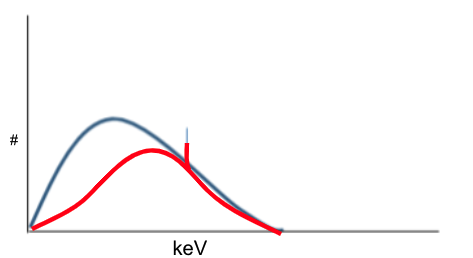
Consider the situation:
Change from 82 kVp to 72kVp
The amplitude (height) of the emission spectrum curve would:
A. Remain the same
B. Decrease
C. Increase
B. Decrease
The backup time for most AECs is set at ____ of the anticipated manual exposure time.
A. 200%
B. 10%
C.100%
D. 50%
A. 200%
Backup time is 1.5-2x longer than exposure time
The energy of a Bremsstrahlung photon is
A. The difference between the entering and exiting kinetic energies of the incoming electron
B. Equal to the kinetic E of the entering electron
C. The sum of the entering and exiting kinetic energies of the incident electron
D. Equal to the kinetic energy of the exiting electron
A. The difference between the entering and exiting kinetic energies of the incoming electron
A photon of x-ray has an electrically positive charge. True or False?
False
A compensating wedge filter would be appropriate for
A. AP c-spine radiography
B. PA hand radiography
C. AP shoulder radiography
D. AP foot radiography
D. AP foot radiography
During x-ray production, almost all of the kinetic energy of the incident electrons is converted to
A. Heat
B. A characteristic photon
C. A brems photon
D. Light
A. Heat
Consider the situation:
Change from 2mm Al filtration to 4mm Al
The discrete (characteristic) curve shifts:
A. left
B. right
C. remains the same
C. remains the same
As the atomic # of an element increases, the energy required to remove an inner shell electron________.
A. Decreases
B. Is unchanged
C. Increases
C. Increases
Characteristic radiation forms a discrete emission spectrum. True or false?
True
The nuclear force which holds electrons in orbit around an atom is called:
A. gravity
B. charge
C. binding energy
D. valence force
C. binding energy
Beam filtration affects patient dose by:
A. Increase entrance skin dose (ESE)
B. Removing high E photons
C. removing low E photons
D. Increasing beam heterogeneity
C. Removing low E photons
What term describes filtration that is a part of the x-ray tube, the tube housing, and the collimation device:
A. added
B. total
C. compensating
D. inherent
D. inherent
During a characteristic interaction, the kinetic energy of the incident electron must be _____ of the electron it knocks from its orbit.
A. characteristic
B. proportional to that
C. greater than that
D. less than that
C. greater than that
Electromagnetic waves travel at the speed of light. True or false?
True
Consider the situation:
Change 82kVp to 72kVp
How would the emission spectrum graph shift?
Moves left
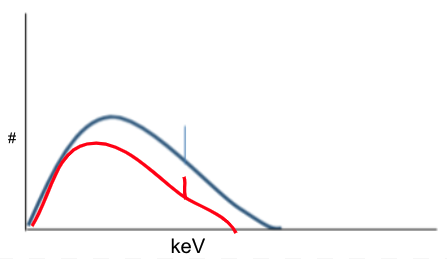
Consider the situation:
Change from high atomic # target material to low atomic #
The continuous curve shifts
A. remains the same
B. left
C. right
B. left
Total beam protective filtration is equal to the sum of _____ filtration.
A. Compound and compensating
B. Subtracted and compensating
C. Inherent and added
D. Implied and compensating
C. Inherent and added
Filtration is the process of eliminating undesirable ___ by the insertion of absorbing materials into the primary beam.
A. high energy incident electrons
B. high energy x-ray photons
C. low energy x-ray photons
D. low energy incident electrons
C. low energy x-ray photons
Consider the situation:
Change from high atomic # target material to low atomic #
The discrete (characteristic) curve shifts:
A. right
B. remains the same
C. left
C. left
In general, low E x-ray photons:
A. are absorbed by the patient
B. improve image quality by quality by affecting contrast
C. are absorbed by the image receptor
D. penetrate the patient and detector
A. are absorbed by the patient
A low E Brems x-ray results when the incident electron is strongly influenced by the nucleus. True or false?
False
The energy of a characteristic photon is:
A. equal to the binding E of the exiting electron
B. the difference between the BE of the outer and inner shells between which the electron dropped
C. the sum of the BE of the outer and inner shells between which the electron dropped
D. equal to the BE of the entering electron
B. the difference between the BE of the outer and inner shells between which the electron dropped
Beam filtration does what to patient dose?
A. it increases patient dose by the square of the filter thickness
B. it increases patient dose
C. it decreases patient dose
D. it has no affect on patient dose
C. decreases patient dose
Who discovered x-rays? On what date?
Wilhelm Roentgen Nov. 8 1895
If a projectile electron is traveling at 70 keV and is deviated by the nucleus with a resulting electron energy of 10 keV, determine the energy of emitted radiation (1 pt). This is an example of what type of radiation? (1 pt)
Brems
70-10=60keV
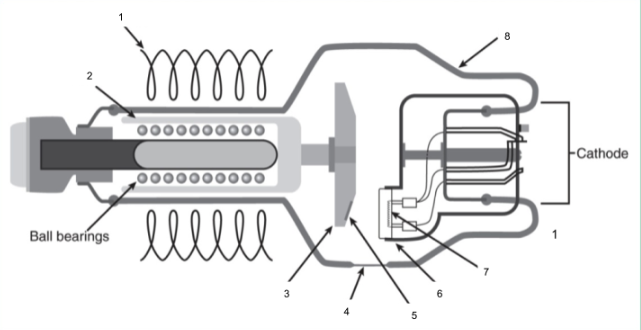
Label following components.
Stator
Rotor
Anode
Window
Target
Focusing cup
Filament
Glass envelope